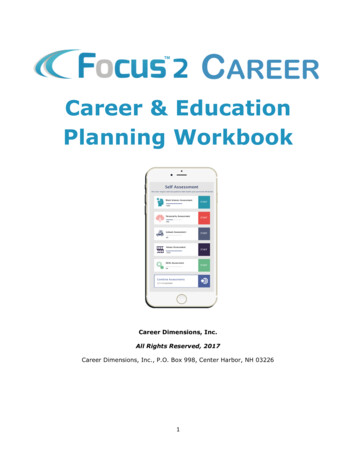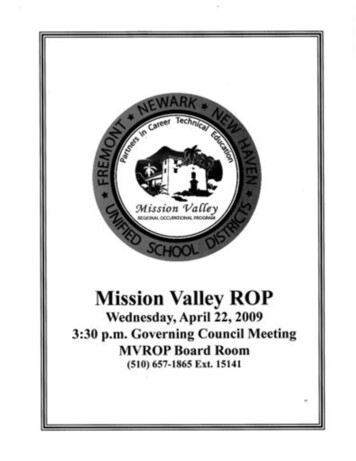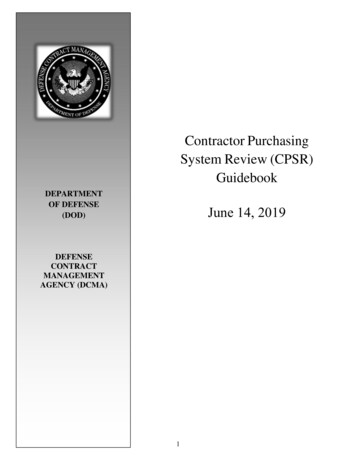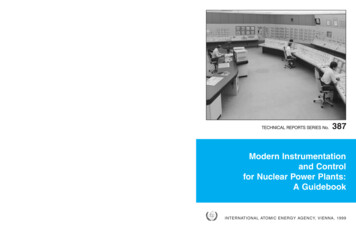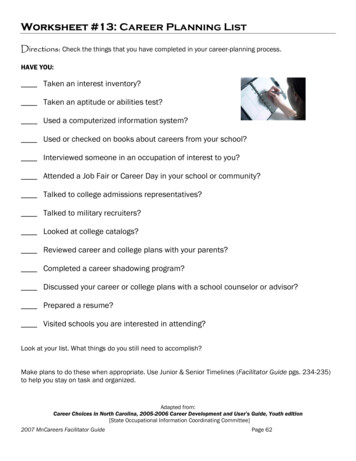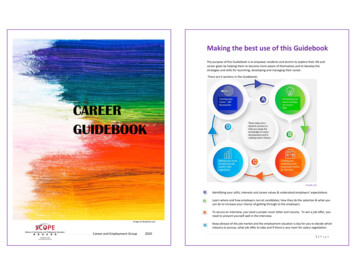
Transcription
Making the best use of this GuidebookThe purpose of this Guidebook is to empower students and alumni to explore their life andcareer goals by helping them to become more aware of themselves and to develop thestrategies and skills for launching, developing and managing their career.There are 4 sections in the Guidebook:CAREERGUIDEBOOKfreepik.comIdentifying your skills, interests and career values & understand employers’ expectationsLearn where and how employers recruit candidates; how they do the selection & what youcan do to increase your chance of getting through to the employersTo secure an interview, you need a proper cover letter and resume. To win a job offer, youneed to present yourself well in the interview.Image by Rawpixel.comCareer and Employment Group2020Keep abreast of the job market and the employment situation is key for you to decide whichindustry to pursue, what job offer to take and if there is any room for salary negotiation.1 Page
Where should you start?It is recommended that you start with the first section on self-discovery, a very importantcareer planning step. However, career development is a dynamic process, you can alsochoose to start from any section and move back and forth between them.INSIDE THIS GUIDEBOOK1. Charting Your Career6 Self-Assessment15 What do Employers look for?2. Developing Your Search Strategy19 The Recruitment Process23 The Assessment Process26 The 4 Steps of Job Search3. Crafting Your Marketing Tools27 Resume43 Cover Letter47 Interviewing4. Making Your Move57 Knowing the Job MarketJust as important59 Survey Reports on Employment and SalaryThere will be a lot of suggested online references shown as hyperlinks under various topics,those are very good resources and exercises for you to learn more about the topic. Forexample, you can take free self-assessment on your work value and interest; you can also takefree aptitude tests, download online resume templates or research the salary offer in the jobmarket. All references are carefully and specially selected at the time this Guidebook is beingcompiled, however, online material is subject to frequent updates and changes, those linksmay not carry the same information by the time you click on them. If this happens, you cangoogle search the topic and reference to other related sites.59 Job Offer Evaluation2 Page60 Salary Negotiation64 Graduate or Professional School5.References3 Page
1. Charting Your CareerGetting StartedImportant terms you need to know:Whether you are a graduate-to-be, gettingready to enter the working world, or you stillhave a few years to chart your career, thisguidebook is here to get you going. Here’s apreview of the 4 sections:CHARTNG YOUR CAREERPlanning a career is an ongoingprocess that there is no realdeadline for. The major youstudied may be related to yourfuture career but it is by no meansthe only consideration. In thissection, you can take steps tounderstand about yourself andinvestigate the career options thatare open to you.DEVELOPING YOURSEARCH STARTEGYCRAFTING YOURMARKETING TOOLSTo let employers know why theyshould employ you, you need tomarket yourself in a way that youcan stand out from the crowd.From pitches to profile, you willlearn the techniques to marketyourself by writing up a goodresume and in interviewing.Career is an occupation or a profession, that one undertakes for a relatively longperiod of his/her life time & derives monetary benefit from it. (Khan et al., 2011)Career Development is an ongoing process of gaining knowledge & improvingskills that will help an individual to establish a career plan. (The University of Iowa,n.d.)Employability is the ability to: gain initial employment;maintain employment and make ‘transitions’ between jobs and roles,andobtain new employment if requiredEmployability means you need to have: MAKING YOUR MOVEThis section directs you to whereyou can learn more about the jobmarket and keep track of it. Howyou to negotiate a job offer andhow to start your first day atwork. To make informed career decisions, the first step you need to know is:Yourself Making informed career decisionsinvolves effective ways to approachand understand variousoccupations, employers, andorganizations. This section willprepare you to be a more effectivejob seeker and to learn more aboutthe recruitment process.4 PageEmployability Assets (competencies)– Knowledge, Skill & AttitudeCareer Management skill - self-awareness, opportunity awareness,decision-making skillsPresentation skillPersonal circumstances and Job Market(Hillage & Pollard, 1998)What motivates you? – Your value, interests, personality What is your dream career or things you love to do in future?What are you good at? - your strongest abilities and skillsWhat is your major accomplishments in action terms?5 Page
Self-AssessmentLearning your own unique pattern of interests, motivation, satisfaction and meaning is key incareer development. You may refer to the following means to guide you through the journey:Discover Your InterestCareer InterestYou may take a free Career Interest test at the following links and (Appendix 1):Interests are what you like to do at work. Holland’s theory of career choice is one of the mostpopular theory in the 1970s. Dr. Holland reasoned that people work best in workenvironments that match their preferences. We want jobs with people like us.RIASEC Theory Most people can be categorized as one of six types (RIASEC - Realistic,Investigative; Artistic, Social, Enterprising, Conventional)There are 6 model environments (RIASEC)People search for environments that will let them exercise their skills andabilities, express their attitudes and values, and take on agreeableproblems and roles.(Holland J.L., 1992, .truity.com/test/holland-code-career-testOther paid career assessment tools such as Strong Interest Inventory and Self-Direct Searchprovide you a more in-depth exploration on your career interest and options.Be mindful: Self-assessment are self-reporting tools, while they can serve as a good reference, they maynot be completely accurate and by no means provide the complete picture.How to interpret your result?While you may have some interests in and similarities to several of the 6 groups, you may beattracted primarily to 2 or 3 of the areas. These 2 or 3 letters are your “Holland Code.” Forexample, with a code of “SAI” you would most resemble the Social type, somewhat lessresemble the Artistic type, and resemble even less the Investigative type. The types that arenot in your code are the types you resemble least of all. Most people, and most jobs, are bestrepresented by a combination of two or three of the Holland interest areas. You are likely tobe more satisfied if you can match your personality with the work environment.To find out what career options are available for different Holland Code, you may refer:http://www.wiu.edu/advising/docs/Holland and-codeFigure 1 : Holland Code RIASEC . (Indiana University South Bend, n.d.)6 Page7 Page
Work ValuesYour SkillsYour work values are the things you believe that are important to you, such as achievement,recognition, security, autonomy, relationship Job satisfaction is highly related to whetherthe job matches with your work values. It is therefore essential for you to understand andprioritize what work values you care the most in making career decision.What do you naturally do well? Take stock of your skills and accomplishments to increaseyour awareness of your strengths.Discover Your AccomplishmentsList 3 Major accomplishments in life that you are proud of and the skills that you have used.Discover Your Work ValuesYou may take free work values test at the following links and explore the list of work valuesand how they may affect your choice of work:Your majorAchievementYou are proudbecause Skills used to achievethe taskDid you enjoy theprocess? Why?Work values test https://www.123test.com/work-values-test/Work importance profiler http://www.onetcenter.org/WIP.html?p 3Work value inventory : Appendix 2Be mindful of other influencing factors such as your family, friends, experiences, personalcircumstances and environment can all affect your choicesHow to interpret your result?If you can find a work environment that fits your work value, you would find greater jobsatisfaction. For example, if you prefer “Variety” i.e. doing different things at work, you arenot likely to be satisfied with routine jobs or if “Flexibility” is very important to you but yourwork environment has very rigid rules and procedures, you may find it frustrating. However,there is no perfect work environment, knowing your top priorities will definitely help youchoose your career path.It is crucial to note that while work value is important in your career choice, you should notconsider them in isolation. You need also to look at your personality type, interests andskills.Using your strengthA role where you can use your strengths is notjust a “nice to have”, you could be your best selfand bring all your talents to work, you’d have alot more room to grow and develop as aprofessional.Take the time to groom your skills and developyour strengths - this will not only help you find abetter job, it will help you realize your calling.freepik.com8 Page9 Page
Discover Your SkillsSkillsLook at the skills for the groupings listed below, place a check on those skills you are good atand reflect on the experiences/examples where you have applied them.Teamwork Collaborate Interpersonal skills Manage conflict Listening skill Reliable Respectable Service-oriented Relate well to restsCritical Thinking/ProblemSolving Learning Reasoning Researching Analyzing estsPhysical/Hands-On Skills Craft Skills Install material Coordination Cook Physical strength Stamina Outdoor skillsTechnology Computing Statistics Accounting Mathematics Scientific EngineeringOthersArtistic Creating Design Perform Visual imaging ProductionYou may also do a skills audit ttenCommunication Speak to new people Explaining ideas Presentation Persuasion Promote ideas Language skillshttps://www.onetonline.org/skills/Reflect and list out the outstanding skillsthat you want to use in your future careerand the skills that you want to furtherdevelop.Personal Effectiveness Time management Acceptingresponsibility Self-disciplined Integrity Resiliency AdaptabilityRawpixel.comRawpixel.com10 P a g e11 P a g e
Your Dream CareerHow to interpret your result?Time flies when one is having fun. Have youever get so absorbed in an activity that youlost track of time?Most of the time, working at your dream job isn’t feasible for one reason or another.Perhaps the job does not guarantee enough financial return. Perhaps you need to develop afew more skills to do the kind of work you really want to do. Perhaps you’re still figuring outwhat your dream job is.Your hobbies can offer some ideas for yourdream career. Try to do the followingexercise and take note of your internalconversation.What can you do if you cannot land on your dream job?Even if the job you are about to take is not an ideal one, you can still learn and grow yourexperience and skills. Try looking for an opportunity with some of the following qualities,you would move at least one step closer to the career of your dreams.1. A job with a mentor that can guide you through your career path. Look at LinkedInfor staff who work in that company and see if there is any potential role models thatyou can connect with.2. A job that you can develop your skills towards your dream job or learn transferrableskills, like, planning and organizing, selling, presentation 3. A job where you can develop your network of connection. Networking is importantfor you to land on your next opportunity.4. A job that has some flexibility of work hours so that you can pursue your dream jobas a hobby or part-time or to invest time to learn and grow expertise in that area.5. A job with a culture that you find fit with your work value.Discover Your DreamsCareer Dreams ExerciseStep 1. List five jobs you love to do for your future career in column A:Column AColumn BColumn CColumn DList fiveDream JobDegree of passion(1 to 5, 1 timeStep 2. In column B, rate by order of importance 1 to 5, 1 being the job you like the most.Step 3. In column C, how practical it is in terms of financial payback, opportunities in the jobmarket, job requirement, etc.? Assign Yes, Maybe, No.Step 4. In column D, would be good and fun as a hobby or part-time or avocation?12 P a g e13 P a g e
After knowing more about yourselfSelf-Assessment - Putting it together!Summarize your results and insights on self-assessment of your Work Interest, Values, DreamCareer and Skills here. You may discover some career options that you may explore further.InterestsIf you have taken career inventory, list out your Holland Codes here that may summarize yourwork interests (Realistic, Investigative, Artistic, Social, Enterprising, Conventional) and thecorresponding career options that you may find interesting after taking the code tests.You have identified your work interest and listed out some potential jobs that may fit yourprofile. Considering your work values, preferences and the skills that you are good at andthose you want to develop, you can further prioritize the career that you would like toexplore.For example, if you are a “Social” type, you value a job that can provide “job security”, your“dream” is to be able to help underprivileged people, you are good at communicating withpeople and you want to develop skills and experience in planning and organizing,
CAREER GUIDEBOOK Image by Rawpixel.com Career and Employm ent Group 2020 1 P a g e Making the best use of this Guidebook The purpose of this Guidebook is to empower students and alumni to explore their life and
